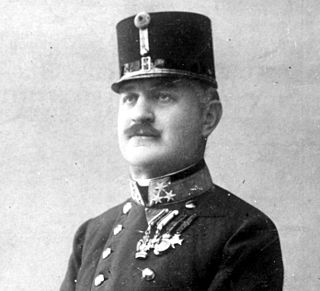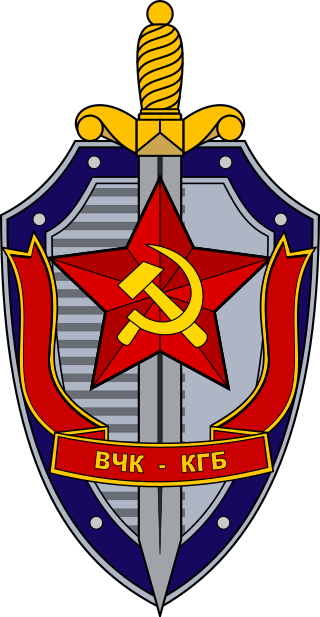Related Research Articles
Espionage, spying, or intelligence gathering is the act of obtaining secret or confidential information (intelligence). A person who commits espionage is called an espionage agent or spy. Any individual or spy ring, in the service of a government, company, criminal organization, or independent operation, can commit espionage. The practice is clandestine, as it is by definition unwelcome. In some circumstances, it may be a legal tool of law enforcement and in others, it may be illegal and punishable by law.

An intelligence agency is a government agency responsible for the collection, analysis, and exploitation of information in support of law enforcement, national security, military, public safety, and foreign policy objectives.

The Security Service, also known as MI5, is the United Kingdom's domestic counter-intelligence and security agency and is part of its intelligence machinery alongside the Secret Intelligence Service (MI6), Government Communications Headquarters (GCHQ), and Defence Intelligence (DI). MI5 is directed by the Joint Intelligence Committee (JIC), and the service is bound by the Security Service Act 1989. The service is directed to protect British parliamentary democracy and economic interests and to counter terrorism and espionage within the United Kingdom (UK).
Tactical or battlefield intelligence became vital to both sides in the field during the American Civil War. Units of spies and scouts reported directly to the commanders of armies in the field, providing details on troop movements and strengths. The distinction between spies and scouts was one that had life or death consequences: if a suspect was seized while in disguise and not in his army's uniform, he was often sentenced to be hanged. A spy named Will Talbot, a member of the 35th Battalion, Virginia Cavalry, was left behind in Gettysburg after his battalion had passed through the borough on June 26–27, 1863. He was captured, taken to Emmitsburg, Maryland, and executed on orders of Brig. Gen. John Buford.

Alfred Redl was an Austro-Hungarian military officer who rose to head the Evidenzbureau, the counterintelligence wing of the General Staff of the Austro-Hungarian Army. He was one of the leading figures of pre-World War I espionage; his term in office was marked by radical innovations and the use of advanced technology to ensnare foreign spies.

The Sator Square is a two-dimensional acrostic class of word square containing a five-word Latin palindrome. The earliest squares were found at Roman-era sites, all in ROTAS-form, with the earliest discovery at Pompeii. The earliest square with Christian-associated imagery dates from the sixth century. By the Middle Ages, Sator squares had been found across Europe, Asia Minor, and North Africa. In 2022, the Encyclopedia Britannica called it "the most familiar lettered square in the Western world".

The Finnish Security and Intelligence Service, formerly the Finnish Security Police and Finnish Security Intelligence Service, is the security and intelligence agency of Finland in charge of national security, such as counter-intelligence and counter-terrorism, under the jurisdiction of the Ministry of the Interior. The agency had a distinct role during the Cold War in monitoring communists as well as in the balance between Finnish independence and Soviet appeasement. After the 1990s, Supo has focused more on countering terrorism and in the 2010s, on preventing hybrid operations.

The frumentarii were an ancient Roman military and secret police organization used as an intelligence agency. They began their history as a courier service and developed into an imperial spying agency. Their organization would also carry out assassinations. The frumentarii were headquartered in the Castra Peregrina and were run by the princeps peregrinorum. They were disbanded under the reign of Diocletian due to their poor reputation amongst the populace.

Dame Winifred Mary Beard, is an English classicist specialising in Ancient Rome. She is a trustee of the British Museum and formerly held a personal professorship of classics at the University of Cambridge. She is a fellow of Newnham College, Cambridge, and Royal Academy of Arts Professor of Ancient Literature.

Sir John Davidson Beazley, was a British classical archaeologist and art historian, known for his classification of Attic vases by artistic style. He was professor of classical archaeology and art at the University of Oxford from 1925 to 1956.
The speculatores, also known as the speculatores augusti or the exploratores, were an ancient Roman reconnaissance agency. They were part of the consularis and were used by the Roman military. The speculatores were headquartered in the Castra Peregrina.
Richard John Alexander Talbert is a British-American contemporary ancient historian and classicist on the faculty of the University of North Carolina at Chapel Hill, where he was William Rand Kenan, Jr., Professor of History and is currently Research Professor in charge of the Ancient World Mapping Center. Talbert is a leading scholar of ancient geography and ideas of space in the ancient Mediterranean world.

The Culper Ring was a network of spies active during the American Revolutionary War, organized by Major Benjamin Tallmadge and General George Washington in 1778 during the British occupation of New York City. The name "Culper" was suggested by George Washington and taken from Culpeper County, Virginia. The leaders of the spy ring were Abraham Woodhull and Robert Townsend, using the aliases of "Samuel Culper Sr." and "Samuel Culper Jr.", respectively; Tallmadge was referred to as "John Bolton".
Martin David Goodman, FBA is a British historian and academic, specialising in Roman history and the history and literature of the Jews in the Roman period.
Michael Hewson Crawford, is a British ancient historian and numismatist. Having taught at Christ's College, Cambridge and the University of Cambridge, he was Professor of Ancient History at University College London from 1986 until he retired in 2005.

The Counter Intelligence Corps was a World War II and early Cold War intelligence agency within the United States Army consisting of highly trained special agents. Its role was taken over by the U.S. Army Intelligence Corps in 1961 and, in 1967, by the United States Army Intelligence Agency. Its functions are now performed by its modern-day descendant organization, United States Army Counterintelligence. The National Counter Intelligence Corps Association (NCICA), a veterans' association, was established in the years immediately following World War II by former military intelligence agents.

The Committee for State Security was the main security agency for the Soviet Union from 13 March 1954 until 3 December 1991. As a direct successor of preceding agencies such as the Cheka, GPU, OGPU, NKGB, NKVD and MGB, it was attached to the Council of Ministers. It was the chief government agency of "union-republican jurisdiction", carrying out internal security, foreign intelligence, counter-intelligence and secret police functions. Similar agencies operated in each of the republics of the Soviet Union aside from the Russian SFSR, where the KGB was headquartered, with many associated ministries, state committees and state commissions.

Spying, as well as other intelligence assessment, has existed since ancient history. In the 1980s scholars characterized foreign intelligence as "the missing dimension" of historical scholarship." Since then a largely popular and scholarly literature has emerged. Special attention has been paid to World War II, as well as the Cold War era (1947–1989) that was a favorite for novelists and filmmakers.
Amanda Jacqueline Claridge FSA was a British professor of Roman archaeology at Royal Holloway, University of London. Her research interests included "Roman archaeology, especially art, marble sculpture and the marble trade; Roman architecture and urbanism; topography and monuments of the city of Rome and Latium; Antiquarian studies in 16th and 17th century Rome."

Anna Marguerite McCann was an American art historian and archaeologist. She is known for being an early influencer—and the first American woman—in the field of underwater archaeology, beginning in the 1960s. McCann authored works pertaining to Roman art and Classical archaeology, and taught both art history and archaeology at various universities in the United States. McCann was an active member of the Archaeological Institute of America, and received its Gold Medal Award in 1998. She also published under the name Anna McCann Taggart.
References
- ↑ Rom, Rami; Gilat, Amir; Sheldon, Rose Mary (2018). "The Yom Kippur War, Dr. Kissinger, and the Smoking Gun". International Journal of Intelligence and CounterIntelligence. 31 (2): 357–373. doi:10.1080/08850607.2018.1417526. S2CID 158530420.
- ↑ "Rose Mary Sheldon". H-net . Retrieved 22 September 2022.